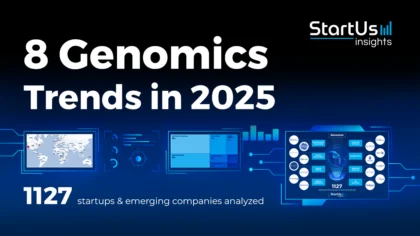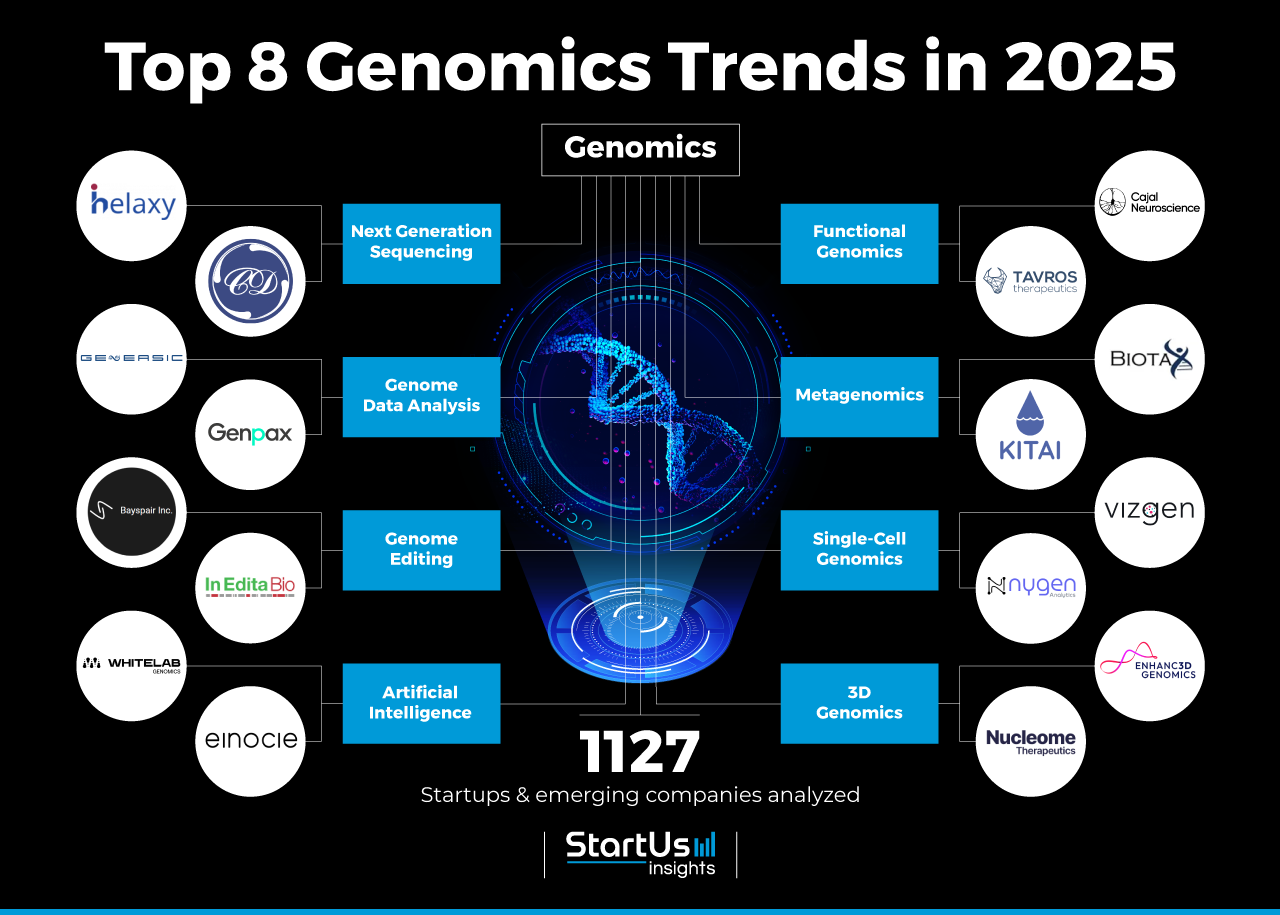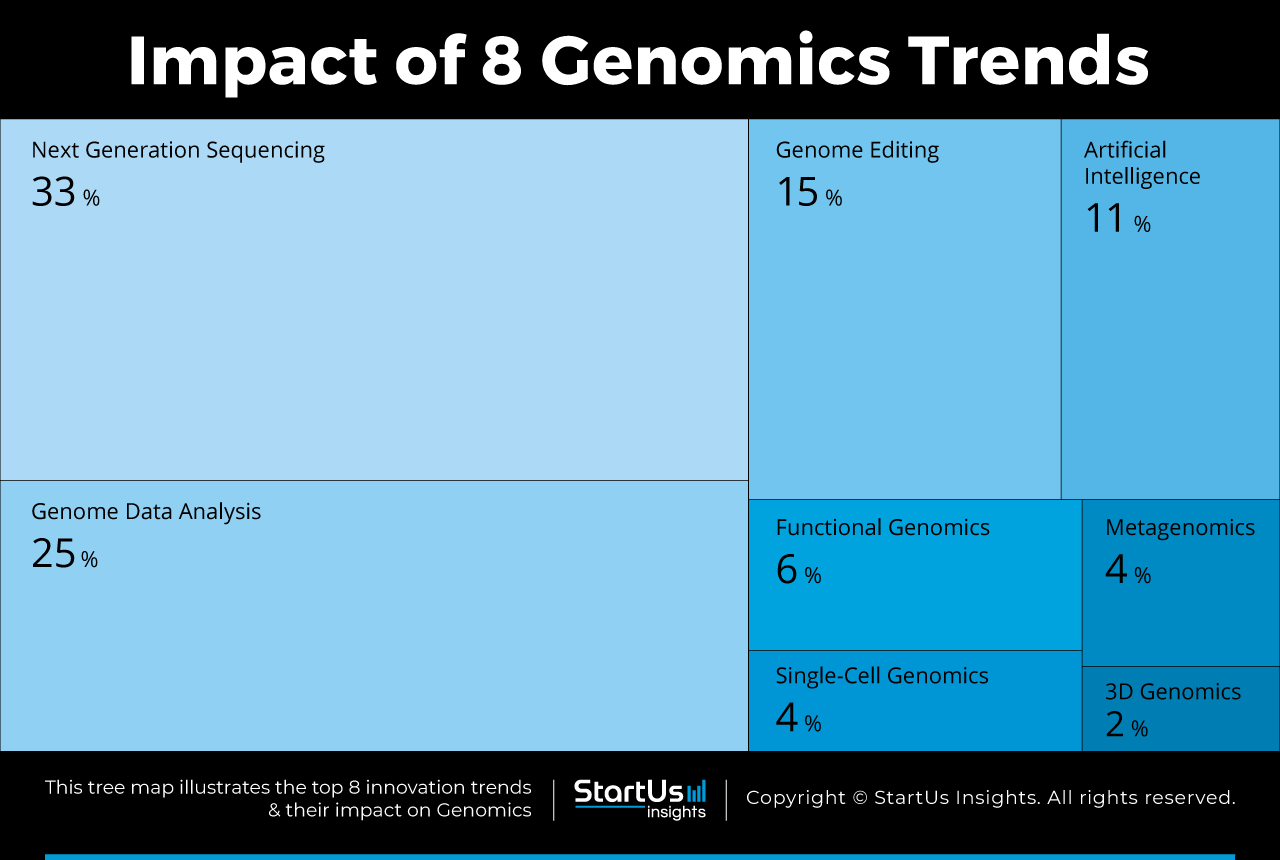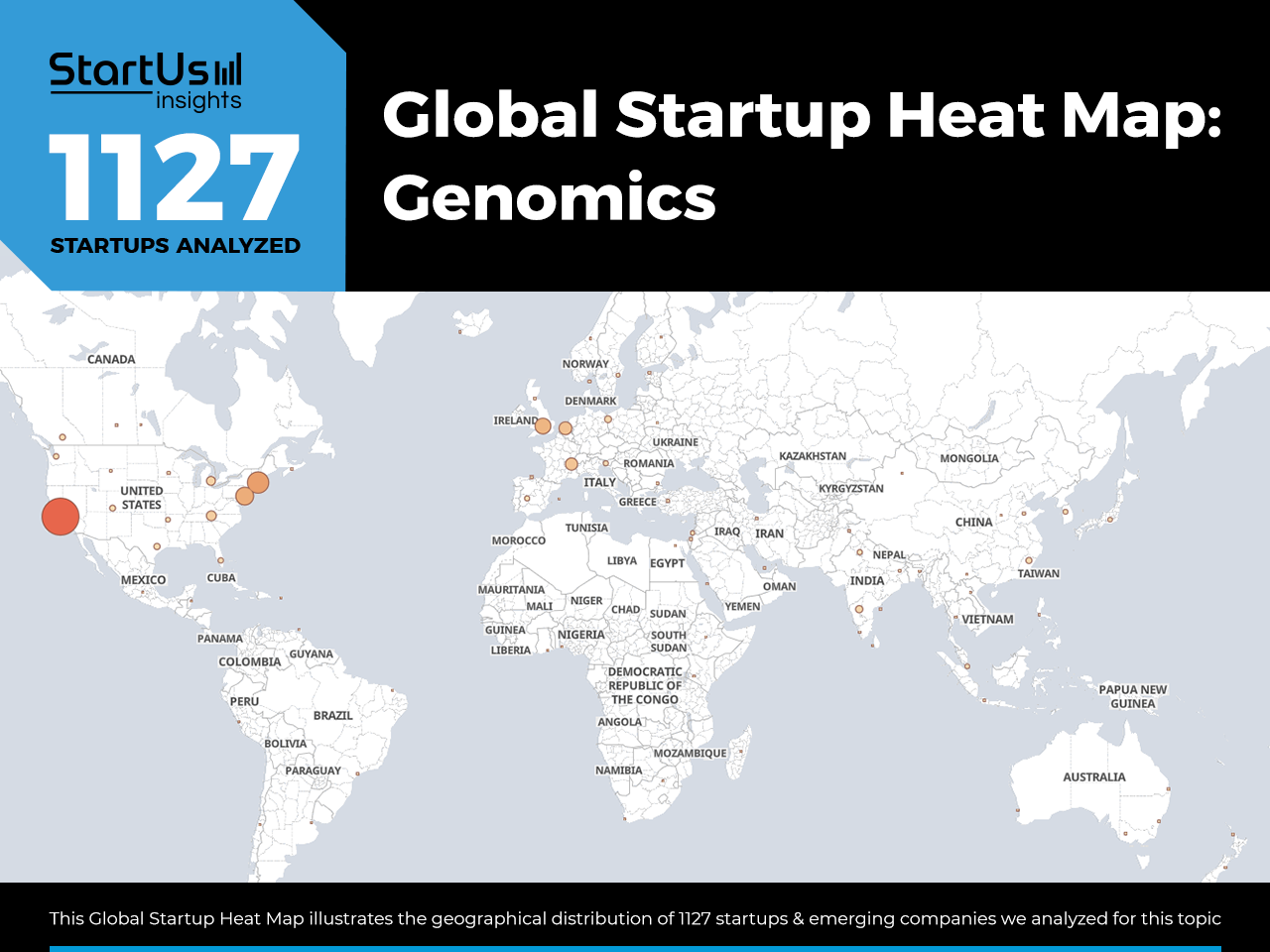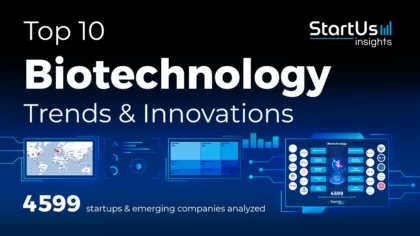The study of genome structures, functions, and evolution is critical to better understanding life on earth and improving human health. Emerging genomics trends allow researchers and companies to leverage novel gene analysis, sequencing, and editing technologies to discover new targets, understand genetic phenotypes, and more. This report provides an overview of top genomics trends and innovations in 2025. They range from next-generation sequencing (NGS) and genomic data analysis to artificial intelligence (AI) and metagenomics. Read more to explore how they impact your business.
This article was last updated in July 2024.
Innovation Map outlines the Top 8 Genomics Trends & 16 Promising Startups
For this in-depth research on the Top Genomics Trends & Startups, we analyzed a sample of 1 127 global startups & scaleups. The result of this research is data-driven innovation intelligence that improves strategic decision-making by giving you an overview of emerging technologies & startups in the biotech industry. These insights are derived by working with our Big Data & Artificial Intelligence-powered StartUs Insights Discovery Platform, covering 4.7M+ startups & scaleups globally. As the world’s largest resource for data on emerging companies, the SaaS platform enables you to identify relevant startups, emerging technologies & future industry trends quickly & exhaustively.
In the Innovation Map below, you get an overview of the Top 8 Genomics Trends & Innovations that impact 1 127 companies worldwide. Moreover, the Genomics Innovation Map reveals 16 hand-picked startups, all working on emerging technologies that advance their field.
Top 8 Genomics Trends
- Next Generation Sequencing
- Genome Data Analysis
- Genome Editing
- Artificial Intelligence
- Functional Genomics
- Metagenomics
- Single-Cell Genomics
- 3D Genomics
Want to explore all Genomics innovations & trends?
Tree Map reveals the Impact of the Top 8 Genomics Trends
Based on the Genomics Innovation Map, the Tree Map below illustrates the impact of the Top 8 Genomics Trends in 2025. Startups and scaleups are developing NGS solutions for high-throughput and affordable sequencing. Genome data analysis and editing technologies also advance the applications of genomics in pharmaceuticals as well as in the industrial, plant, and animal biotechnology areas. Functional genomics, metagenomics, and single-cell genomics offer a better understanding of how intergenic regions, environment, and a cell as a unit affect biological processes. On the other hand, advances in 3D genomics allow researchers to leverage spatial genetic structures to understand the link between genomes and phenotypes.
Global Startup Heat Map covers 1 127 Genomics Startups & Scaleups
The Global Startup Heat Map below highlights the global distribution of the 1 127 exemplary startups & scaleups that we analyzed for this research. Created through the StartUs Insights Discovery Platform, the Heat Map reveals that the US sees the most startup activity.
Below, you get to meet 16 out of these 1 127 promising startups & scaleups as well as the solutions they develop. These 16 startups are hand-picked based on criteria such as founding year, location, funding raised, & more. Depending on your specific needs, your top picks might look entirely different.
Top 8 Genomics Innovation Trends for 2025
1. Next Generation Sequencing
Traditional DNA sequencing methods lack the capacity to provide genome analysis at speeds that the biotech sector demands. This is where next-generation sequencing aids researchers and biotech companies. Startups are advancing a range of NGS technologies to enable ultra-high throughput and scalable genome sequencing. This is enabling rapid sequencing of whole genomes, deep sequencing of target regions, and faster human genome analysis. Moreover, NGS solutions greatly accelerate drug discovery workflows and enable precision medicine.
Helaxy offers Fluidics NGS Prep
Helaxy is a Singaporean startup that develops a fluidics NGS prep solution. It features flexible sample and assay setup as well as minimizes hands-on time to mitigate manual pipetting errors. Additionally, the solution uses generic reagent cartridges to reduce reagent wastage. This allows hospitals to leverage decentralized COVID testing and move testing closer to the patients, saving time.
CD BioSciences enables NGS Library Synthesis
CD BioSciences is a US-based startup that creates htDNA-chip, a DNA synthesis platform for NGS. It assists researchers in preparing NGS libraries efficiently and makes millions of nucleotide chains in a single run. The platform also supports whole-genome sequencing, RNA sequencing, targeted sequencing, exome sequencing, and more. This enables high-throughput sequencing, shorter turnaround times, and high-fidelity customization.
2. Genome Data Analysis
Efficient data management is essential to minimize errors in genome data analysis. At the same time, maintaining in-house data warehouses is cost- and labor-intensive for biotech companies. To tackle this issue, startups build genome data analysis as a service platforms. These platforms allow research institutions and companies to mitigate complex IT infrastructure and centralize data analysis. Genomic data analysis solutions also integrate data protection to tackle sensitive information leaks and other cybersecurity issues.
GENEASIC accelerates NGS Data Analysis
GENEASIC is a Taiwanese startup that provides GeneASIC NGSAAP, an ultra-fast NGS data analysis platform. It miniaturizes sequencing analysis pipelines to a compact size without compromising accuracy. Additionally, the solution leverages local computing to ensure data privacy and security. It offers hospitals, health management centers, and research institutes instant access to genotypic information, saving time and ensuring data safety.
Genpax provides Pathogen Intelligence
UK-based startup Genpax builds a data analytics platform for pathogen intelligence. It performs whole genome sequencing (WGS) analysis of bacterial pathogens for early identification and characterization of emerging pathogen threats. The platform also features a standardized, decentralized, and scalable architecture to remove heavy costs associated with WGS analysis.
3. Genome Editing
Off-target effects and mosaicism are the primary safety concerns in genome editing. With advances in CRISPR-Cas9 genome engineering, startups and scaleups are overcoming these challenges. Researchers also utilize bioinformatics to develop more reliable genome editing mechanisms. Moreover, the efficiency of CRISPR drives innovations in epigenome editing. There is growing interest in gene therapy agents to treat infectious and genetic diseases, including cancers. They allow pharma companies and healthcare institutions to ensure patient safety and improve treatment effectiveness.
Bayspair advances Scarless Genome Editing
US-based startup Bayspair develops scarless genome editing technology. The technology uses off-guide editing and supports the modification of sequences apart from guide RNA targets. While CRISPR/Cas9 enables DNA sequence insertion at approximate positions, the startup’s solution is adaptable for editing at exact, predetermined sites. This allows biotech companies and researchers to mitigate off-target effects in genome editing, improving plant breeding and drug screening.
InEdita Bio enables Plant Genome Editing
Brazilian startup InEdita Bio facilitates plant genome editing for sustainable soybean and maize production. The startup’s gene editing platform restores lost variability in plants. It also enables the development of pest and disease-resistant crops by controlling the expression of regulatory elements. This improves farm yields and reduces chemical pesticide usage, thereby benefitting the environment.
4. Artificial Intelligence
Artificial intelligence processes massive genomic datasets to decipher hidden trends and patterns. That is why researchers use AI technologies like machine learning and deep learning to speed up data analysis. In clinical and healthcare genomics applications, AI improves drug discovery and disease diagnostics workflows. Plant and animal genomic analysis solutions leverage AI to accelerate the identification of specific genes responsible for certain traits and diseases. Efforts by companies to centralize real-world evidence (RWE) also make AI-driven genome analysis more effective.
WhiteLab Genomics advances Gene Therapies
WhiteLab Genomics, a French startup, focuses on AI-powered solutions for genomic medicine. Its proprietary AI platform expedites target discovery and drug design for DNA and RNA therapies. It leverages curated and validated datasets to enhance predictive capabilities. WhiteLab Genomics integrates advanced in-silico predictions and streamlines the design process. This ensures efficient and accurate identification of therapeutic targets.
Einocle provides Single-Cell Genetic Analysis
Einocle is a South Korean startup that develops an AI-powered single-cell genetic analysis platform. It analyzes numerous cells and genes in biological samples such as tissues. This allows researchers to study gene expression levels and cell-to-cell interactions. The platform supports the development of optimal treatments for uncurable diseases through precision medicine.
5. Functional Genomics
Dysregulation of genes causes diseases such as diabetes, autoimmune diseases, and cancer. Therefore, it is crucial for researchers to understand how intergenic regions impact biological processes. Functional genomics leverage omic technologies, NGS, and epigenome editing to describe gene functions and interactions. This improves the understanding of genetic interaction mapping and DNA/protein interactions at the DNA level and enhances deep mutational sequencing at the protein level. Consequently, functional genomics improves disease modeling and drug target identification.
Cajal Neuroscience advances Neurodegenerative Disease Drug Discovery
US-based startup Cajal Neuroscience aids neurodegenerative disease drug discovery. The startup combines high-throughput microscopy, functional genomics, and multi-omics analyses to identify new drug targets. It also utilizes in vitro and in vivo screens to prioritize and functionally validate numerous genes. Further, the startup’s light-sheet microscopy platform visualizes the biological effects of targets to evaluate complex spatial genotypes, accelerating drug discovery.
Tavros Therapeutics develops Targeted Cancer Therapies
Tavros Therapeutics is a US-based startup that creates targeted cancer therapies. The startup’s high-throughput functional genomics discovery platform identifies cancer cell weaknesses exposed due to drug treatments. Such context-specific vulnerabilities provide pharma companies with predictive biomarkers and optimal drug combinations for improved therapeutic response.
6. Metagenomics
Conventional cultivation-based cultures are unable to retain microbial biodiversity from environmental samples. Metagenomics enables researchers to study genetic materials recovered from environmental samples. For this, metagenomics solutions utilize genomic and bioinformatics tools. Innovations improving metagenomics include NGS, third-generation sequencing (TGS), and functional metagenomics. Functional metagenomics enables researchers to identify enzymes with desirable properties, discover novel bioactives, and analyze antibiotic resistance development. Metagenomics thus finds applications in environmental remediation, biofuel generation, soil microbe analysis, and more.
BiotaX simplifies Metagenomics Analysis
Israeli stautrwq`p BiotaX is an Israeli startup that develops TaxonAI, a metagenomic analysis platform. It combines AI and metagenomics to predict multiple disease states and calculate optimal interventions. The startup’s live biotherapeutic product (LBP) production technology, CustomBiome, then isolates the targeted live microbes to fight dysbiosis. BiotaX solutions enable early detection of colorectal cancer and efficient screening of pancreatic ductal adenocarcinoma.
KITAI enables Real-time Environmental Analysis
KITAI is a Chilean startup that facilitates real-time environmental analysis. The startup’s lab-on-a-chip combines AI, microfluidic, and metagenomics technologies to perform various analyses. This includes biovolume percentage analysis of cyanobacteria, identification of biological pests, and cyanotoxin-based microbiome classification. This allows researchers to perform biological condition monitoring of water sources, analyze environmental pathogens, and more.
7. Single-Cell Genomics
Single-cell genomics analyzes individual cells in the context of their microenvironments using NGS. This narrows down transcriptome analysis to single-cell input levels and uncovers cellular differences otherwise marked by bulk sampling. For example, researchers are able to study cell properties and genomic heterogeneity during normal development and diseases, accelerating drug discovery. Single-cell genomics further finds use in the study of prenatal diagnosis, tissue mosaicism, organogenesis, and embryogenesis, among others.
Vizgen offers Single-Cell Spatial Genomics
US-based startup Vizgen develops MERSCOPE, an in situ single-cell spatial genomics analysis platform. Its quantitative and genome-scale multiplexed imaging feature identifies nucleic acids in their native tissue environments. The platform also features resolution scaling from subcellular to tissue. Vizgen’s solutions thus enable researchers insights into biological systems governing human health and disease with spatial context.
Nygen Analytics enables Interactive Single-Cell Genomic Analysis
Nygen Analytics is a Swedish startup that develops Scarf Web, a cloud-based interactive analysis of single-cell genomics, transcriptomics, and epigenomic datasets. It allows researchers to analyze single-cell data without programming or high-performance computing (HPC) to discover cell types, marker genes, and more. At the same time, Scarf Web enables bioinformatics and sequencing centers to deliver, share, and publish datasets quickly.
8. 3D Genomics
Chromosomal interactions and topological changes due to developmental or environmental stimuli affect gene expression. 3D genomics allows scientists to study how chromatin architecture drives DNA replication, gene expression, and genome integrity. Researchers are also advancing 3D genomics through innovations in chromosome conformation capture (3C)-based technologies. This includes genome-wide chromosome conformation capture (Hi-C) and chromatin interaction analysis using paired-end tag sequencing (ChIA-PET). These solutions provide better visibility into spatial genome organization, chromosomal interaction patterns, and more.
Enhanc3D Genomics advances 3D Genome Mapping
UK-based startup Enhanc3D Genomics is a UK-based startup that creates GenLink3D, a 3D genome mapping platform. It leverages machine learning and Hi-C technologies to profile 3D genomes. The platform also profiles genes and their enhancers at high resolutions, linking gene enhancers and non-coding genetic variants to their target genes. This allows researchers to discover previously undetected causal disease genes and gene networks for autoimmune disease and cancer therapeutics.
Nucleome Therapeutics simplifies 3D Genome Analysis
Nucleome Therapeutics is a UK-based startup that builds a 3D genome analysis platform. It uses machine learning to predict disease-linked genetic variants that impact functional elements in the dark genome. It also predicts the cell types affected by genetic variants and experimentally links variants to genes. The platform’s 3D genome analysis thus offers better precision and sensitivity. This provides researchers with new drug targets and associated biomarkers required for developing therapeutic assets and treating diseases.
Discover all Genomics Trends, Technologies & Startups
Advances in NGS and genome editing will extend the use cases of genomics across industries, including industrial biotechnology. Additionally, startups are integrating AI, HPC, and other data processing solutions to accelerate data-driven workflows and cut down turnaround time. The future of genomics will further focus on the exploration of already available data to improve processes and products.
The Genomics Trends & Startups outlined in this report only scratch the surface of trends that we identified during our data-driven innovation & startup scouting process. Among others, high-throughput sequencing, AI, & functional genomics will transform the sector as we know it today. Identifying new opportunities & emerging technologies to implement into your business goes a long way in gaining a competitive advantage. Get in touch to easily & exhaustively scout startups, technologies & trends that matter to you!
